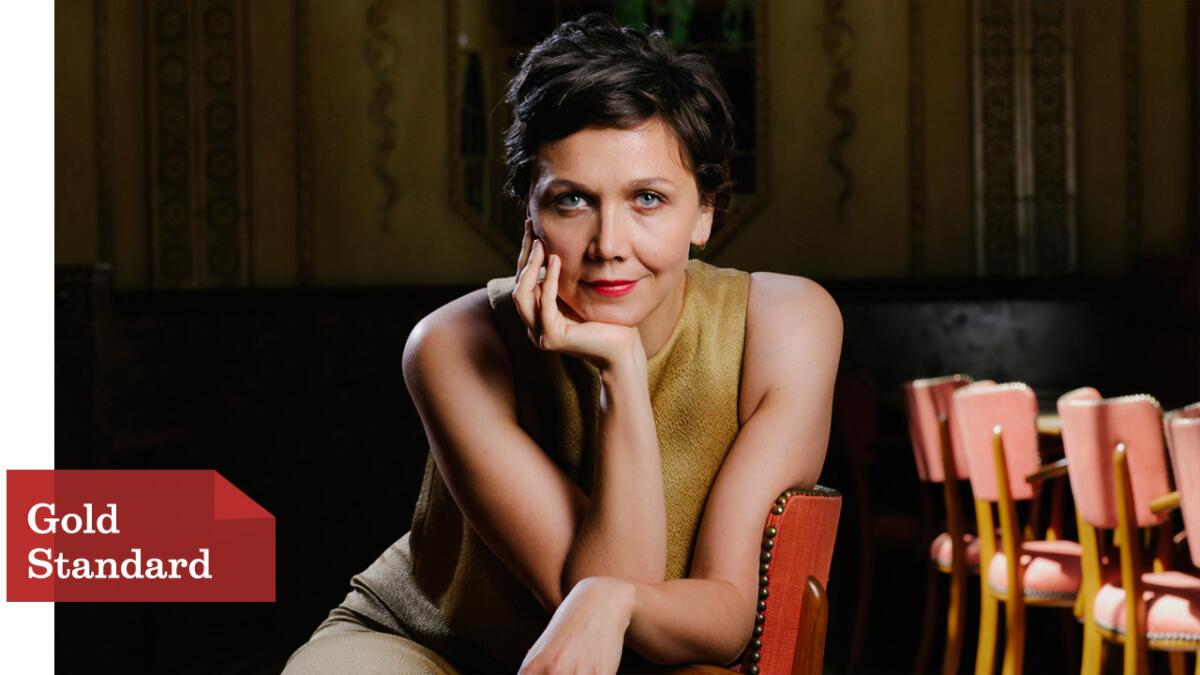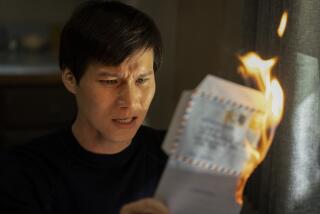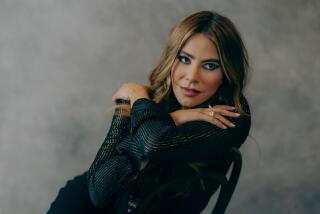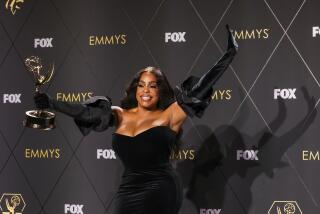‘Honorable Woman’ Maggie Gyllenhaal learns to put her trust in others

Maggie Gyllenhaal starred as Baroness Nessa Stein in Sundance Channel’s miniseries “The Honorable Woman.”
Maggie Gyllenhaal tends to rely on instinct over character analysis and dissection in her work. The full portrait of a particular role comes to her only after filming ends, in retrospect, she says.
So perhaps it is only now — a year and a half and a Golden Globe later — that she just might have a handle on Baroness Nessa Stein, the billionaire heiress at the center of “The Honorable Woman.”
“One of the ways of seeing this — what it’s about for me right now — is, who are you, actually?” she says of the eight-part political thriller. “How is who you are different than the fantasy of who you were, who you thought you were supposed to be, who other people think you are supposed to be? And not just with Nessa, and not just with me, but also with Israel and Palestine and geopolitics in general; who are you actually? And you look at that story through Nessa.”
Full Coverage: Emmys 2015
The Sundance TV limited series, from British writer-director Hugo Blick, does offer the 37-year-old actress much to chew on with the complex role of Stein, who along with her brother, Ephra, inherits her father’s business selling arms to Israel yet works to promote peace between Israel and Palestine.
“In Episode 1,” says the New-York based actress, “you see that she’s just not capable of keeping [life] up anymore, and she keeps trying. And again, I didn’t know this consciously as I was making it, I really went into it in an unconscious way, but I can see now that she’s starting to crumble. Hugo says he thinks about her as someone in shock; those aren’t my words, but I understand.”
Part of the shock Stein carries comes from the cursed karmic burden of being the orphaned daughter of a Zionist weapons procurer, one responsible for swaths of deaths in the Middle East. Then there are the gruesome deaths, terrors and betrayals that befall the Stein family.
“Who do you trust” is the poignant series opening voice-over, done in Gyllenhaal’s posh British accent.
And trust, or the lack thereof, is an overarching theme of the Sundance series. It’s something the actress admits struggling with on a personal level.
Timeline: Emmy winners through the years
“I actually did not feel an instant trust with [Blick], but I don’t feel an instant trust with anybody,” Gyllenhaal says on a May afternoon at Hollywood’s Chateau Marmont. “It’s not easy for me to trust. Hugo says he trusted me the minute I walked on to the set. And at first I thought, ‘Well, that’s not very discerning of you!’ He told me that really early on.
“He was so generous and open and loving with his trust and with his hopefulness for me and what I could hopefully do for him. I mean, he was so giving and generous and all that, and I would just not trust him.
I’m not proud of that, but it’s true, I was scared.”
She says a turning point came about midway through filming.
“I remember there was a scene and I went over to him and I just sort of said something — we actually spoke very little, we really ESP’d each other, almost in code — I said, ‘It should be like this.’ And he went ‘Right, right.’ And they changed it. And someone next to him said, ‘Do you just do whatever she says?’ And he said, ‘I trust her.’
“And what came out of my mouth was, ‘I trust you a little.’ I was teasing him because it was the only way I could say, ‘Wow, I really do trust you.’ By the end of the shoot, I loved him deeply and was deeply impressed by him — and I hope vice versa; I know vice versa.”
Video: Emmy contender live chats
Gyllenhaal even dedicated the emotive episodic voice-over to Blick, both of them having left its recording to nearly the last days of shooting. If you listen to it closely, you can hear various meanings. But for her, there’s only one: “Really, it’s me telling him that I trust him,” she says.
It was a trust hard-earned and well-placed. “The Honorable Woman” won high critical praise, with The Times’ Mary McNamara calling the series “a thing of beauty” and noting Gyllenhaal’s performance is “by turns sweet and steely, humane and meta-human, her Nessa burns with a cold self-imposed stillness born of anguish and fury, and is like no modern woman we have ever seen before on any screen.”
For Gyllenhaal, who made headlines after telling an interviewer she had recently been warned that at 37 she was too old to play a love interest opposite a 55-year-old man, that new kind of on-screen woman is overdue.
“I think it’s very common, and has been in film and in television, to allow men to be both likable and not likable, both honorable and not honorable,” she says. “It’s less frequent that you see roles for women when they can be called an antihero and be accepted.”
She finishes the thought with a final tribute to Blick: “I think surely a man wrote ‘The Honorable Woman’ who really loved women.”
More to Read
From the Oscars to the Emmys.
Get the Envelope newsletter for exclusive awards season coverage, behind-the-scenes stories from the Envelope podcast and columnist Glenn Whipp’s must-read analysis.
You may occasionally receive promotional content from the Los Angeles Times.






